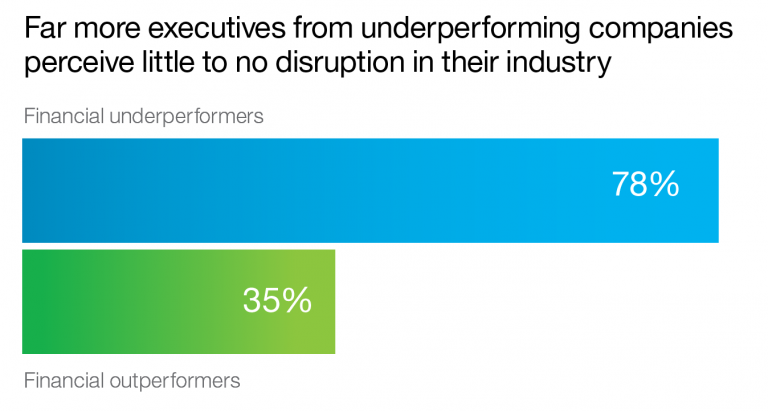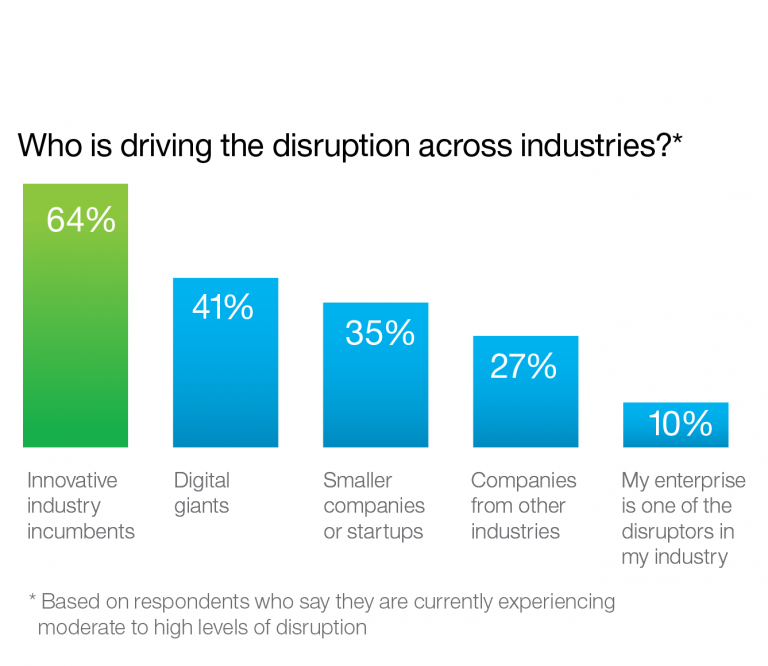Industry disruption is here to stay according to research institutions, top analysts and the business press, but many C-suite executives (CxOs) beg to differ.
Almost half of the 6,000 CxOs we’ve surveyed through June as part of the IBM Global C-suite Study say their industry is experiencing little to no disruption today. If disruption really is the new business normal, why do so many executives fail to recognize it?
Perhaps most of the companies claiming minimal disruption have already successfully countered disruptive forces. But that seems unlikely. For example, one of the most important characteristics that separates those who see disruption from those who don’t is performance. Far more executives whose companies have outperformed the market in the last few years (relative to their industry peers) say they are experiencing disruption in their industry. Twice as many financial underperformers as outperformers claim their industry is experiencing little to no disruption. Without the skills and readiness to comprehend the rapidly evolving business landscape right in front of them, these organizations risk being swept away in a sea of unpredictable change.

An alternative explanation could be that the risk-versus-reward of a full-blown transformation in response to disruption just doesn’t stack up for many. Of those executives who claim that there is little to no disruption occurring in their industry, less than a third rated their organizations as being effective at managing change in the past. That being said, a lack of success with transformational change in the past doesn’t necessarily equate to an inability to do so in the future.
A more likely scenario is that the notion of disruption is evolving, and many organizations have yet to expand their field of vision or develop the nimbleness to navigate through it. As traditional companies begin to catch up with the rapidly changing digital landscape, the perceived threat from “digital invaders” has been surpassed by the resurgence of competitors operating within one’s own industry. In effect, some industry incumbents have had the time and space to develop, test and refine their own ways of exploiting digital technologies to regain the upper hand against disruptive forces.
Of those executives who are experiencing some level of disruption in their industry, two-thirds identified innovative industry incumbents (those deploying new technologies, processes or business models to change the rules of the game) as the driving force behind that disruption. Those incumbents are doing so to a much greater extent than the startups we would normally associate with this trend, or even “digital giants” such as Google, Apple or Alibaba. This reinforces the earlier C-suite Study finding that executives expect future competition is much more likely to come from within their own industry.

Ultimately, disruption skeptics need to consider an inescapable truth: the rate of technological change is exponential, and they are losing their window of opportunity to decide whether to innovate or continue plodding on. Analysts may believe that most companies recognize the necessity for continuous change, but a sizeable portion of the executives in our study (49 percent) still say there’s very little urgency to do so. Given the International Data Corporation (IDC) forecast that organizations will spend USD 1.2 trillion in 2017 on digital transformation technologies in response to disruption, our no-disruption group has some catching up to do. Once they’ve acknowledged the threat of disruption, their level of agility in response to rapid and unpredictable change will be a powerful determinant of success in the digital economy.
This blog is part of a monthly series that highlights preliminary findings and emerging trends from our 19th Global C-suite Study. The study is based on interviews with more than 10,000 CxOs.
Meet the author


